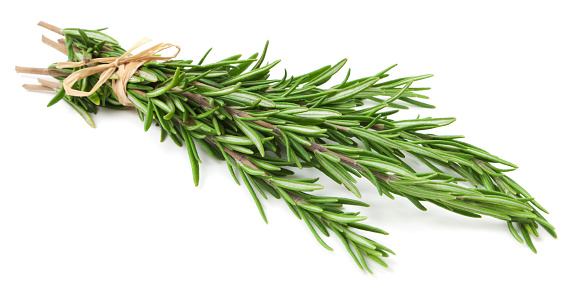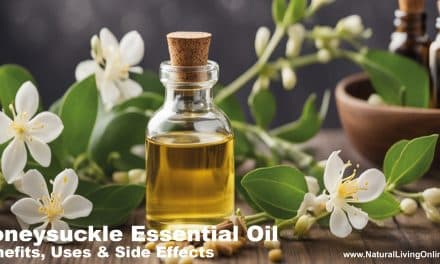Rosemary essential oil comes from the Rosmarinus officinalis plant and has a host of beneficial properties. It’s high in antioxidants, making it great for skin health, and also contains antibacterial and antiseptic agents that make it useful for respiratory problems and digestive issues.
Essential Oil Profile / Monograph
Botanical Name: Rosmarinus officinalis
Common Names: Rosemary, Compass Weed, Dew of the Sea
Plant Family: Lamiaceae
Countries of origin: Morocco
Extraction Method: Steam distillation
Parts Used: Flowering tops
Essential Oil smell: Strong, fresh, minty-herbaceous with a balsamic-woody undertone
Essential Oil Color: Clear to pale yellow
Viscosity: Medium
Perfumery Note: Top
Strength of Aroma: Strong
Blends Well With: Basil, Bergamot, Cedarwood, Chamomile Roman, Eucalyptus Globulus, Ginger Root CO², Lavandin, Lemon, Melissa, Myrtle, Peppermint, Pine Scots, Ravensara aromatica
Therapeutic Properties: Analgesic, anti-inflammatory, antimicrobial, antispasmodic, astringent
Uses: Topical / Aromatherapy / Natural Perfumery
Contraindications: Avoid during pregnancy. Not for children under the age of 12.
Side Effects: When used appropriately, rosemary essential oil is considered safe and has few side effects. However, pregnant women should avoid using it as it may have an effect on the uterus. It can also increase blood pressure and is not recommended for people who are taking anticoagulant medication or suffer from high blood pressure.
Chemical Constituents: Carnosol (12-22%), Rosmarinic Acid (12-21%), Beta-Caryophyllene (11-17%), Alpha-Pinene (11-14%), Limonene (11-12%), Camphene (11-12%), Borneol (up to 12%)
What is Rosemary?
Rosemary is an herb that belongs to the mint family. It grows wild throughout the Mediterranean region and is often used in cooking. The leaves and flowers of rosemary have a strong aroma that is reminiscent of pine needles or camphor.
Rosemary plants can grow to be as tall as six feet (two meters) in height and produce flowers ranging from pale blue through purple shades. The leaves are oblong shaped with pointed tips and smooth edges; they range from light green when young, turning darker over time until eventually becoming almost black when fully mature.
Benefits
Rosemary essential oil is used for aromatherapy, skincare products such as lotions and creams (due to its anti-aging properties), hair care like shampoos or conditioners to help with dry scalp conditions like dandruff), also it acts as an insect repellent due to its smell which repels mosquitoes away naturally without having to use chemicals on your skin The best way to enjoy rosemary essential oil is through a diffuser in the room. Rosemary can be added into food recipes by adding it directly before serving time; this will allow you get maximum flavor and health benefits from the rosemary.
Some potential benefits:
– Reducing stress and anxiety
– Boosting cognitive performance
– Helping to improve memory retention
– Acting as an anti-inflammatory agent
– Supporting healthy digestion
– Regulating blood sugar levels
– Preventing signs of premature aging
– repelling insects naturally without chemicals.
Topical use
When used topically, rosemary essential oil is said to be helpful for conditions like eczema, psoriasis, and acne. It can also be used as a massage oil to relieve muscle pain or tension headaches.
Rosemary essential oil for benefits skin: To help improve the appearance of skin and reduce the signs of aging, add a few drops of rosemary essential oil to your favorite lotion or cream. You can also add it to homemade skincare products. For example, try adding it to a sugar scrub for an invigorating and refreshing treatment.
Rosemary essential oil for benefits hair: Rosemary essential oil can help improve the appearance of hair and scalp. To use it for hair care, add a few drops to your shampoo or conditioner, or massage it into your scalp before washing your hair. You can also add it to homemade hair care products, like a deep conditioning treatment or hot oil treatment.
Internal Use
Rosemary essential oil should not be taken internally unless under the supervision of a qualified healthcare practitioner.
For kids
Rosemary essential oil is safe for kids when used in low concentrations and diluted properly. When using it topically, be sure to do a patch test first to check for any sensitivities. It should not be taken internally by children unless under the supervision of a qualified healthcare practitioner.
For pets
Rosemary essential oil can be used on pets, but it should be diluted properly and used in low concentrations. When using it topically, be sure to do a patch test first to check for any sensitivities. It should not be taken internally by pets unless under the supervision of a qualified healthcare practitioner.
Aromatherapy
Rosemary essential oil can be used in an aromatherapy diffuser to help boost cognitive performance, improve memory retention, and reduce stress and anxiety. It can also be added to baths or used in a massage oil blend.
Diffuser blends with Rosemary for aromatherapy
– Rosemary and lavender for relaxation
– Rosemary and peppermint for energy
– Rosemary and eucalyptus for congestion relief
– Rosemary and lemon for a refreshing scent
– Rosemary and orange for a uplifting scent
– Rosemary and grapefruit for a invigorating scent
– Rosemary and Cypress for a grounding scent.
DIY recipes
Sugar scrub: Mix together sugar, olive oil, and Rosemary EO for a refreshing and invigorating scrub.
Shampoo: Mix together castile soap, Rosemary EO, and lavender essential oil for a gentle and cleansing shampoo.
Conditioner: Mix together coconut milk, Rosemary EO, and vitamin E oil for a nourishing and conditioning treatment.
Deep conditioning treatment: Mix together avocado oil, Rosemary EO, and egg yolk for a deep conditioning treatment.
Hot oil treatment: Mix together olive oil, Rosemary EO, and vitamin E oil for a hot oil treatment.
Frequently Asked Questions
Who should not use Rosemary oil?
People with high blood pressure, epilepsy, or other seizure disorders should not use Rosemary oil. It is also not recommended for pregnant or nursing women, or for people who are taking blood thinners or other medications that could interact with it.
Does Rosemary oil interact with any medicine?
Rosemary oil can interact with certain medications, including blood thinners and medications for high blood pressure, epilepsy, and other seizure disorders. If you are taking any of these medications, talk to your doctor before using Rosemary oil.
Can you use Rosemary oil everyday?
Yes, you can use Rosemary oil everyday. Just be sure to dilute it properly and start with a low concentration, especially if you are using it topically.
Can I directly use Rosemary oil on face?
No, you should not apply Rosemary oil directly to your face. Dilute it properly first, and do a patch test on a small area of skin to make sure you are not sensitive to it.
How to use Rosemary oil for hair growth?
Rosemary oil can be used to help stimulate hair growth. Dilute it with carrier oil like almond oil and massage a few drops into your scalp every day. You can also add Rosemary oil to shampoo or conditioner, or make your own hair treatment by mixing it with other oils like coconut oil or avocado oil.
Can I leave Rosemary oil overnight in my hair?
Yes, you can leave Rosemary oil in your hair overnight. Just be sure to dilute it properly and cover your head with a shower cap or towel to prevent it from staining your pillowcase.
Is Rosemary oil safe for cats and dogs?
Avoid using any essential oil on your pets. You can use it in aromatherapy but not in confined space along with your pet.
References:
Rosmarinus officinalis L. (rosemary) as therapeutic and prophylactic agent
An Evidence-Based Systematic Review of Rosemary
The essential oil of rosemary and its effect on the human image and numerical short-term memory
This website does not provide medical advice.
All information provided on this website, and on associated social media networks, including but not limited to texts, images, and numbers are for general information purpose only. It is not intended as medical advice and it does not include all possible precautions, side effects, or interactions that may occur. Neither NaturalLivingOnline.com nor its author/founder take responsibility for how you use this information. Statements contained on NaturalLivingOnline.com have not been evaluated by the FDA. You should conduct thorough research via multiple sources and consult your physician or qualified doctor before using any essential oil or herbal remedy. Information on NaturalLivingOnline.com must not be relied upon for medical, legal, financial or other decisions.













